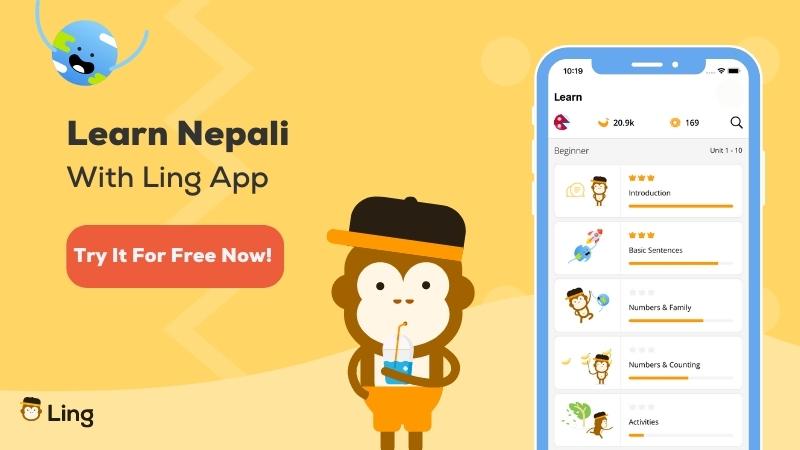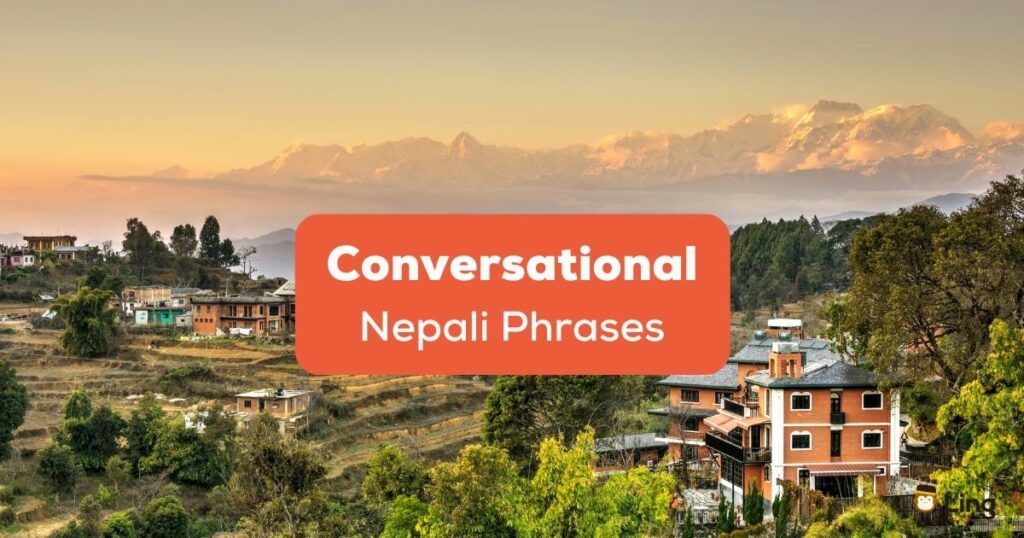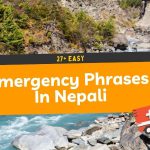Nepalese people are truly some of the friendliest and warmest folks you’ll ever meet. They always have a smile on their face and a calm demeanor that’s infectious. But if you really want to get closer to them and understand their culture, there’s one thing you can do: learn conversational Nepali phrases!
Nepalese people, known for their warm hospitality and rich cultural heritage, are a diverse group of ethnic communities that make up the population of Nepal. From the towering Himalayan peaks to the lush subtropical forests of the Terai, Nepalese people have adapted to living in some of the most challenging environments on the planet and have emerged with a strong sense of community and resilience. Want to connect with them better? If so, then use the conversational Nepali phrases we rounded up below!
9+ Conversational Nepali Phrases
1. तपाइको नाम के हो? (Tapaainko naam ke ho?)
One of the most basic conversation starters is by asking someone’s name. It would be odd if you continuously converse with someone without even knowing their name. However, if you ever meet people and have a hard time understanding or pronouncing their names, make sure to write them down and memorize them. It would be awkward for you to continuously ask what their name is, don’t you think?
2. नमस्ते (Namaste)
You’ve probably come across this word multiple times already, but this greeting is one of the backbones of the Nepali language. It’s a part of their religious culture, and doing this shows respect to their elders and the people around them. While if you don’t follow this custom, then you’ll be viewed as disrespectful or disobedient.
3. याहा अस्पातल कहा छ? (Yaha Aspatal Kaha Chha?)
One of the most basic phrases that you can use when visiting Nepal is yaha aspatal kaha chha? which simply translates to “Where’s the hospital?” It even becomes an important phrase during emergencies. Looking at the statistics of Nepali people, wherein only 15% of the population can speak English, it’s safe to say that learning this phrase can be a lifesaver if you’re staying in rural areas of Nepal.
4. रामरो डाक्टर कहा दुख्छ ? (Ramro Daktar Kaha Paincha?)
After figuring out where the hospital is, you must be on the hunt for a good doctor. As a tourist, getting into minor to severe accidents can trigger your anxiety, especially if you don’t know what to do first. So, before taking your flight to Nepal, make sure to read through travel guides when visiting a foreign country.
Anyway, going back to this conversational phrase that directly translates to “Where can I find a good doctor?” No one likes getting treatment from unregistered professionals, so it’s safe to remember this phrase during your trip.

5. मा हराए (Ma Haraye)
Did you get too excited to the point that you got lost? Well, the first rule is not to panic! You better contact a friend or family member whom you traveled with or ask locals for your location. While you may use ma haraye to say that you’re lost in the Nepali language. Still, be careful with strangers, talking to them without precaution can put you in danger.
6. मैले भुझिना/माबुझचु (Maile Bhujhina/Mabujhchu)
There’s no shame in being honest if you don’t understand the locals well. You can simply tell them mabujhchu or maile bujhina to say you don’t understand what they are saying. Instead of pretending, you can just admit the truth. Who knows, they might even teach you a few words and phrases that can help you fit in well with the environment!
7. कोलाज पैसा खर्च हुन्छ? (Location, Kolagi kati paisa lagchha?)
If you took a tourist bus or some local transportation vehicle, it’s quite obvious that you have to pay certain fares. So, this phrase can help you get through the day seamlessly if you need to know the cost of tickets. It specifically translates to “How much to get to (location)?” Also, make sure to get your money exchanged when traveling, alright?
8. तिमीलाई कस्तो छ? (Timīlā’ī kasto cha?)
Formally speaking with a friend during casual meet-ups can be pretty awkward. So, if you want to just catch up with them and loosen up a bit, using this informal greeting should do the trick. You may say timīlā’ī kastō cha? or “How are you?” to your peers or individuals who are the same age as you.
9. मा थिका छु (Ma Thika Chu)
There are cases in which they are first to ask you how you are doing, and to directly answer their question, you may just say ma thika chu, meaning “I’m fine.”
Other Phrases To Use In Nepali Conversations
We can’t cut the list short with nine basic phrases, don’t you think? Mastering the Nepali language requires a lot of practice, and to make it easier for you to navigate through hundreds of phrases, here’s a quick list you can refer to:
| English | Pronunciation | Nepali |
| Sorry! | Māpha garnuhōs! | माफ गर्नुहोस् |
| Pardon me. | Malā’ī māpha garnuhōs. | मलाई माफ गर्नुहोस्! |
| Thank you. | Dhan’yavāda | धन्यवाद |
| Have you eaten? | Khana khannu bhaiyo? | खाना खन्नुहुन्छ भाइ? |
| Have a good day! | Subha dina. | शुभ दिन |
| Good evening. | Subha sandhyā. | शुभ सन्ध्या |

Want To Learn More About The Nepali Language?
Expanding your vocabulary and learning conversational Nepali phrases isn’t really the best way to start learning Nepal’s mother tongue. How can you understand maile bhujhe if you don’t even know the proper grammar structure, verb bases, and infinitive form of their words? Luckily, Ling is here to your rescue.
Learning Nepal’s language isn’t a piece of cake, in fact, you may even have your brain cells do several backflips to fully decipher the Nepali Devanāgarī alphabet. But with enough practice, you may master it in no time. With the app, you can actively improve yourself day by day with its mind-crunching exercises and interactive activities. Can’t wait to become a pro? Get Ling today on Play Store or App Store for FREE!


































































